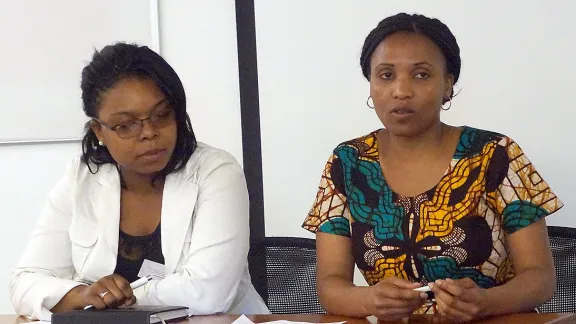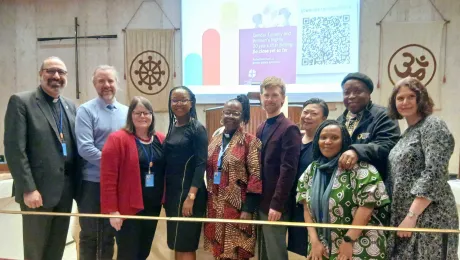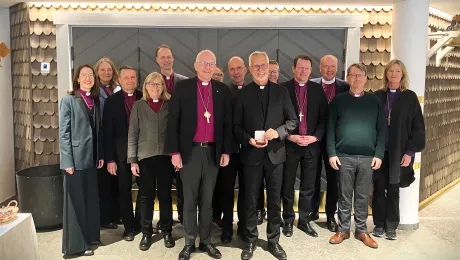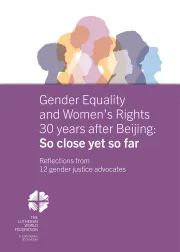
Christine Mangale (right) says the July training workshop on women's human rights that she attended in Geneva, complements ongoing advocacy by the Lutheran Office for Wold Community in New York. Photo: LWF/P. Mumia
By Christine Mangale
There is no end to education and, therefore, lifelong learning is critical if people have to make progress either individually or as a group.
The Lutheran Office for World Community in New York helps coordinate the participation of representatives of The Lutheran World Federation (LWF) member churches in global events, such as the United Nations Commission on the Status of Women (CSW) held in New York every year.
Recently, I was honored to participate in advocacy training for faith-based organizations, with a special focus on women’s human rights, in Geneva. The July event was jointly organized by the LWF, Finn Church Aid, the World YWCA, the World Council of Churches and ACT Alliance. It brought together participants from 18 different countries—women and men with various areas of expertise ranging from monitoring government compliance with human rights standards, women’s legal support, protection of ethnic minorities and education to raising awareness on women’s rights and leadership. The aim was to help participants better understand United Nations’ mechanisms and international conventions such as the Elimination of All Forms of Discrimination Against Women (CEDAW), the Universal Periodic Review (UPR) and the UN Commission on the Status of Women.
I moderated a workshop that explored links between CEDAW, UPR and the proposed UN Post-2015 Development Agenda, including the Sustainable Development Goals (SDGs). The goals seek to address the unfinished business of the Millennium Development Goals, but extend much further and will be applied universally. Goal five is about achieving gender equality and the empowerment of all women and girls. This month, the UN Summit is scheduled to adopt the post 2015 agenda.
Closing the gap
The Commission on the Status of Women meets annually for two weeks at the UN Headquarters. As the principal inter-governmental body dedicated to promoting gender equality and women’s empowerment, it is a key stakeholder in negotiating and achieving the SDGs. The office where I work, the Lutheran Office for World Community, has been working since 1973 to lift up the voices of people whose human rights are violated. Our office monitors a number of key concerns at the UN, including gender inequality and women’s empowerment as some of the main ones. We do all the planning and hosting of Lutheran delegates who attend the Commission’s sessions.
While the world has made major strides in acknowledging gender inequality and trying to close the gap either through laws and sensitization on the inherent dignity and equality between women and men, the task is far from over. As the late South African President Nelson Mandela once said, “After climbing one great hill, one only finds that there are many more hills to climb.” Women have been climbing one hill after another for centuries now. Implementation of these international agreements is slow and uneven, and at times lacking. It is therefore critical that faith-based organizations build their members’ capacity to be able to identify the structural causes of women’s inequalities as well as monitor and report on implementation of the respective agreements. The LWF, through its training events, builds capacity of women and men on how to access and use these UN mechanisms effectively and thereby contribute to monitoring the implementation of internationally-agreed treaties and procedures.
Tremendous opportunities for advocacy
Women’s participation in decision-making processes is critical. The July training in Geneva exemplified the complementary work of gender mainstreaming that the Lutheran Office for World Community does in New York on behalf of the LWF. However, addressing the structural causes of women’s inequality and their socio-economic needs remains a major challenge.
Strategically placed in communities, faith-based organizations like the LWF collectively affirm the human rights of all. They are called to examine how they integrate gender justice and analysis in their daily work. Unique to their call, FBOs are tasked with speaking to each other in love, but firmly, and to call out those who are hostile to women’s rights and hold on to patriarchal norms and practices disguised as religion and tradition. FBOs have tremendous opportunities for advocacy. They have support networks and alliances that if mobilized fully, can engage constructively in advocating for all women’s human rights.
The top of the next hill is within reach. Call on your government, and church leaders to affirm women’s human rights.
Christine Mangale is program coordinator at the Lutheran Office for World Community in New York, United States. Established in 1973 to represent the LWF and the Evangelical Lutheran Church in America at the UN headquarters, the office advocates for people whose human rights are violated.


